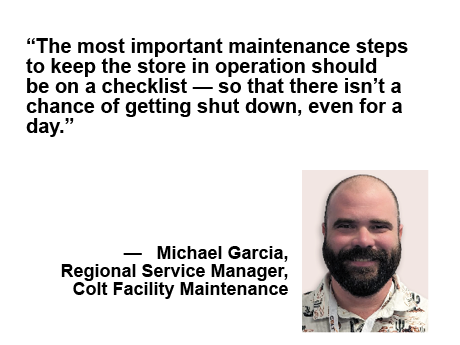Business owners have a lot on their plate; it’s a full-time job to survive in the ultra-competitive fields of restaurants and retail. In this challenging environment, facilities management often takes a back seat. Yet, diligent maintenance not only showcases a business’s care for its premises but also fosters opportunities for success by attracting clientele. Plus, a proactive maintenance strategy can identify necessary repairs long before they escalate into significant issues.

Colt Facility Maintenance
A clean, well-maintained facility can bring customers to a store or restaurant, says MaryAnn Velez, a sales executive at Colt Facility Maintenance. These businesses are also sending a message to partners and vendors — that this facility is reliable. Well-organized checklists and an experienced maintenance partner can make these steps to success easy.
Maintaining a Maintenance Checklist
Michael Garcia, a regional service manager at Colt Facility Maintenance, explains that the best practice for facility managers is to keep a detailed checklist of equipment and facility needs, along with dates noting maintenance. Prioritizing essential maintenance tasks on a checklist minimizes the risk of unexpected shutdowns and keeps tasks simple, says Garcia. “The most important maintenance steps to keep the store in operation should be on a checklist — so that there isn’t a chance of getting shut down, even for a day.”
Regular monitoring, particularly of elements vital for health codes and employee safety, is crucial. For instance, temperature readings that ensure compliance with health standards can prevent restaurant closures.
“If you’re a restaurant, you need to be absolutely sure that you’re getting correct temperature readings for water. Incorrect readings keep restaurants from meeting the health code and health standards for temperature. This is one of the main things that can shut down a restaurant. However, this issue is avoidable with regular preventative maintenance audits,” Garcia says.
Automated temperature monitors and alarms can also assist with temperature control and regulation throughout the building.
Other factors for restaurant operators and retailers to check regularly include the following:
- Sediment build-up in water systems. This includes pipes, valves, filtration systems and heaters. Flush lines regularly to avoid this issue and consider a water softening system.
- Signs of leaks and rusting. Assess roofs, toilets, faucets, HVAC systems and more.
- Trip hazards in flooring. Resolve immediately and ask staff to point out issues as they become apparent.
- HVAC systems. Clean or replace filters regularly.
- Grease traps and exhaust systems. Prevent buildup and avoid fire hazards.
- Exterior of the building. Review regularly to ensure the building facade, signage, parking lot, sidewalks and landscaping are free of damage.
Garcia recommends instituting a preventative maintenance program, with checkups scheduled two to four times yearly, in addition to the regularly scheduled checks from owners and operators. These proactive measures not only help control costs but also preempt emergency repairs and minimize operational downtime.
Technology, Best Practices and Human Expertise
When it comes to repairs or maintenance that owners and operators cannot implement on their own, an experienced partner is key. Third-party maintenance providers play a pivotal role in ensuring smooth operation for businesses, offering specialized expertise and resources beyond in-house capabilities. This way, businesses can focus on their core activities while entrusting critical maintenance tasks to a reliable partner.
Embracing technological advancements is ingrained in Colt’s best practices. Utilizing sonar and video scopes enables precise leak detection, while their scheduling systems keep maintenance on track for clients. However, human intelligence remains the linchpin of their operation.
Velez emphasizes the need for clear and frequent communications with clients to effectively address their specific needs. “We really focus on communicating with the customer,” she says explaining the importance of providing real-time updates on maintenance projects.
“We’re always making sure that we understand what clients want — what their pain points and their challenges are. Once we know that, we can attack and execute,” Velez explains.
The company boasts a wealth of expertise in facilities management, with seasoned plumbers specializing in commercial facilities maintenance. Their employees have decades of experience in the niche field of maintaining commercial facilities.
“A majority of plumbers are trained in the field of residential plumbing,” says Garcia. However, those plumbers are often not trained in the specific needs of commercial real estate, which demands specialized tools and scheduling. Colt plumbers know the world of commercial facilities management inside and out. This expertise means that little problems cannot grow into big issues for facilities.
Furthermore, Colt assists clients in mitigating risks posed by extreme weather events — providing support during and after emergencies. Services range from supplying generators during hurricanes to clearing snow and ice from roofs. Regularly scheduled maintenance keeps an emergency or extreme weather from becoming a flashpoint for damage.
Velez underscores the importance of reassuring local communities during a crisis. “It’s vital for a business to help the local community feel safe and keep their stores up and running as recovery begins. In emergencies, we can bring everybody back to normal,” says Velez.
By prioritizing maintenance, businesses not only enhance their allure to customers but also fortify themselves against unforeseen disruptions, solidifying their reputation for reliability and longevity in fiercely competitive markets.
— By Andrew Asch. Colt Facility Maintenance is a content partner of Retail & Restaurant Facility Business. For more articles from and news about Colt Facility Maintenance, click here.

